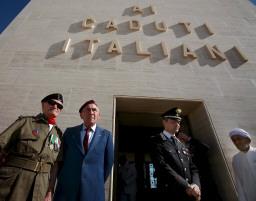Italy is to get the stretch of North African desert where thousands of its soldiers fell in one of the key battles of the Second World War.
Egyptian President Hosni Mubarak on Wednesday told outgoing Italian Premier Romano Prodi that Italy would be handed ownership of the El Alamein war cemetery where almost 5,000 Italian soldiers were buried after what is now seen as a heroic defeat.
The two other military cemeteries at the site - one for German troops and the other for Commonwealth soldiers - have long been owned by the countries that maintain them.
Italy failed to arrange a transfer of property in the 1950s when its cemetery was started and subsequent bids foundered.
The cemetery, which holds 4,814 bodies, has been run since its inception by a private Italian association that honours Italian WWII dead, Onorcaduti.
The maintenance of the graveyard will now be taken over by the Italian government which plans a series of improvements.
After Prodi's announcement of Mubarak's ''sign of friendship and fraternity between our two peoples,'' the Italian premier's office in Rome said an Italian general would shortly be asked to oversee work ''to safeguard a place dedicated to the memory of the heroes who fell for the Homeland''.
The interior ministry said the donation of the land was ''an act which compels us, even more so than in the past, to preserve the memory of the sacrifice of those boys who fought with valour and fell with Italy in their hearts''.
''It is an act that calls us to defend the silence of the desert so that Italians and Europeans may heed the message of peace that still issues from their resting place''.
Over the past decade Italy has sought to revive memories of a battle in which, according to impartial historians, Italian soldiers fought with great courage against superior odds.
The Battle of El Alamein started on October 23, 1942. About 108,000 Italian and German troops under the apparently invincible General Erwin Rommel were pitched against about 220,000 British and Commonwealth soldiers led by General Bernard Montgomery.
By November 5, Montgomery had succeeded in definitively blocking Rommel's advance along the North African coast, and laying the basis of the Allies' subsequent control of the entire region from Morocco to Egypt.
A total of about 17,000 men died in the 12 days of fighting. Among the dead were 5,600 Italians, most of whom were buried in the Italian war cemetery built on a ridge overlooking the battle plains.
In 2002, on the 60th anniversary of the three battles that decided the outcome of the North African campaign, then president Carlo Azeglio Ciampi went to the small town in the Egyptian desert to honour the dead on both sides.
In his speech before hundreds of elderly El Alamein survivors from different nations, the president said that generations which have not lived through war must be made fully aware of the price paid for their liberty and democracy.
Ciampi's visit to El Alamein, about 100km west of Alexandria, came amid an upsurge of interest in the battle and a greater awareness in Italy and abroad of the courage shown by the Italian soldiers who fought there.
As the president flew to Egypt to take part in memorial ceremonies, an exhibition on the battle was staged in Milan, documentaries were scheduled on national TV and the movie 'El Alamein' came out.
The conviction that Italian troops fought heroically at El Alamein had been championed most visibly by the rightwing National Alliance, which evolved from Italy's post-war neo-fascist party.
But politicians from the centre-left opposition also said that, despite having been on the 'wrong side,' Italian soldiers at El Alamein saved the honour of the army.
Non-Italian war historians also revised their traditionally negative view of the nation's military, typified by the jokes about Italian tanks having nine reverse gears and only one to go forward.
A new book on El Alamein by two British historians, John Bierman and Colin Smith, had several good things to say about Italian soldiers in the North African campaign.
''The Italian tank regiment, despite the prattle about the abundance of reverse gears, fought with great audacity, just as the 'Ariete' artillery regiment did,'' Bierman told Italian TV in an interview broadcast today.
According to American historian John W.Gordon, whose book Behind Rommel's Lines was recently translated into Italian, the British special forces were so impressed by the methods and tactics of the Italian desert corps that they actually copied them.
Italy's crack paratrooper regiment, the 'Folgore,' sent some 5,000 of its men to El Alamein. Only 304 returned.
''The paratroopers threw themselves against oncoming tanks with Molotov cocktails and live mines,'' said Francesco Marini Dettina, a survivor of the battle who was awarded a silver medal for valour.
Interviewed for a documentary, Dettina said: ''They urged us to surrender but the only answer they got came from the artillery with our last remaining shells. The British were surprised by the Italians' behaviour.''
British Prime Minister Winston Churchill said in a speech to the House of Commons a month after El Alamein: ''We must honour the men that were the Lions of the Folgore''.













